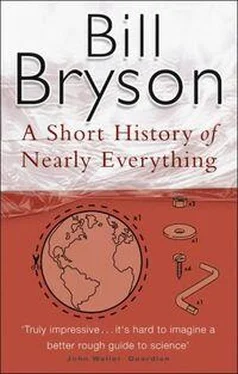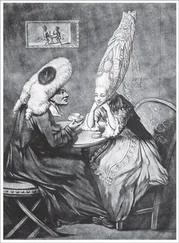FitzRoy’s formal assignment was to chart coastal waters, but his hobby-passion really-was to seek out evidence for a literal, biblical interpretation of creation. That Darwin was trained for the ministry was central to FitzRoy’s decision to have him aboard. That Darwin subsequently proved to be not only liberal of view but less than wholeheartedly devoted to Christian fundamentals became a source of lasting friction between them.
Darwin’s time aboard HMS Beagle, from 1831 to 1836, was obviously the formative experience of his life, but also one of the most trying. He and his captain shared a small cabin, which can’t have been easy as FitzRoy was subject to fits of fury followed by spells of simmering resentment. He and Darwin constantly engaged in quarrels, some “bordering on insanity,” as Darwin later recalled. Ocean voyages tended to become melancholy undertakings at the best of times-the previous captain of the Beagle had put a bullet through his brain during a moment of lonely gloom-and FitzRoy came from a family well known for a depressive instinct. His uncle, Viscount Castlereagh, had slit his throat the previous decade while serving as Chancellor of the Exchequer. (FitzRoy would himself commit suicide by the same method in 1865.) Even in his calmer moods, FitzRoy proved strangely unknowable. Darwin was astounded to learn upon the conclusion of their voyage that almost at once FitzRoy married a young woman to whom he had long been betrothed. In five years in Darwin’s company, he had not once hinted at an attachment or even mentioned her name.
In every other respect, however, the Beagle voyage was a triumph. Darwin experienced adventure enough to last a lifetime and accumulated a hoard of specimens sufficient to make his reputation and keep him occupied for years. He found a magnificent trove of giant ancient fossils, including the finest Megatherium known to date; survived a lethal earthquake in Chile; discovered a new species of dolphin (which he dutifully named Delphinus fitzroyi ); conducted diligent and useful geological investigations throughout the Andes; and developed a new and much-admired theory for the formation of coral atolls, which suggested, not coincidentally, that atolls could not form in less than a million years-the first hint of his long-standing attachment to the extreme antiquity of earthly processes. In 1836, aged twenty-seven, he returned home after being away for five years and two days. He never left England again.
One thing Darwin didn’t do on the voyage was propound the theory (or even a theory) of evolution. For a start, evolution as a concept was already decades old by the 1830s. Darwin’s own grandfather, Erasmus, had paid tribute to evolutionary principles in a poem of inspired mediocrity called “The Temple of Nature” years before Charles was even born. It wasn’t until the younger Darwin was back in England and read Thomas Malthus’s Essay on the Principle of Population (which proposed that increases in food supply could never keep up with population growth for mathematical reasons) that the idea began to percolate through his mind that life is a perpetual struggle and that natural selection was the means by which some species prospered while others failed. Specifically what Darwin saw was that all organisms competed for resources, and those that had some innate advantage would prosper and pass on that advantage to their offspring. By such means would species continuously improve.
It seems an awfully simple idea-it is an awfully simple idea-but it explained a great deal, and Darwin was prepared to devote his life to it. “How stupid of me not to have thought of it!” T. H. Huxley cried upon reading On the Origin of Species . It is a view that has been echoed ever since.
Interestingly, Darwin didn’t use the phrase “survival of the fittest” in any of his work (though he did express his admiration for it). The expression was coined five years after the publication of On the Origin of Species by Herbert Spencer in Principles of Biology in 1864. Nor did he employ the word evolution in print until the sixth edition of Origin (by which time its use had become too widespread to resist), preferring instead “descent with modification.” Nor, above all, were his conclusions in any way inspired by his noticing, during his time in the Galápagos Islands, an interesting diversity in the beaks of finches. The story as conventionally told (or at least as frequently remembered by many of us) is that Darwin, while traveling from island to island, noticed that the finches’ beaks on each island were marvelously adapted for exploiting local resources-that on one island beaks were sturdy and short and good for cracking nuts, while on the next island beaks were perhaps long and thin and well suited for winkling food out of crevices-and it was this that set him to thinking that perhaps the birds had not been created this way, but had in a sense created themselves.
In fact, the birds had created themselves, but it wasn’t Darwin who noticed it. At the time of the Beagle voyage, Darwin was fresh out of college and not yet an accomplished naturalist and so failed to see that the Galápagos birds were all of a type. It was his friend the ornithologist John Gould who realized that what Darwin had found was lots of finches with different talents. Unfortunately, in his inexperience Darwin had not noted which birds came from which islands. (He had made a similar error with tortoises.) It took years to sort the muddles out.
Because of these oversights, and the need to sort through crates and crates of other Beagle specimens, it wasn’t until 1842, six years after his return to England, that Darwin finally began to sketch out the rudiments of his new theory. These he expanded into a 230-page “sketch” two years later. And then he did an extraordinary thing: he put his notes away and for the next decade and a half busied himself with other matters. He fathered ten children, devoted nearly eight years to writing an exhaustive opus on barnacles (“I hate a barnacle as no man ever did before,” he sighed, understandably, upon the work’s conclusion), and fell prey to strange disorders that left him chronically listless, faint, and “flurried,” as he put it. The symptoms nearly always included a terrible nausea and generally also incorporated palpitations, migraines, exhaustion, trembling, spots before the eyes, shortness of breath, “swimming of the head,” and, not surprisingly, depression.
The cause of the illness has never been established, but the most romantic and perhaps likely of the many suggested possibilities is that he suffered from Chagas’s disease, a lingering tropical malady that he could have acquired from the bite of a Benchuga bug in South America. A more prosaic explanation is that his condition was psychosomatic. In either case, the misery was not. Often he could work for no more than twenty minutes at a stretch, sometimes not that.
Much of the rest of his time was devoted to a series of increasingly desperate treatments-icy plunge baths, dousings in vinegar, draping himself with “electric chains” that subjected him to small jolts of current. He became something of a hermit, seldom leaving his home in Kent, Down House. One of his first acts upon moving to the house was to erect a mirror outside his study window so that he could identify, and if necessary avoid, callers.
Darwin kept his theory to himself because he well knew the storm it would cause. In 1844, the year he locked his notes away, a book called Vestiges of the Natural History of Creation roused much of the thinking world to fury by suggesting that humans might have evolved from lesser primates without the assistance of a divine creator. Anticipating the outcry, the author had taken careful steps to conceal his identity, which he kept a secret from even his closest friends for the next forty years. Some wondered if Darwin himself might be the author. Others suspected Prince Albert. In fact, the author was a successful and generally unassuming Scottish publisher named Robert Chambers whose reluctance to reveal himself had a practical dimension as well as a personal one: his firm was a leading publisher of Bibles. Vestiges was warmly blasted from pulpits throughout Britain and far beyond, but also attracted a good deal of more scholarly ire. The Edinburgh Review devoted nearly an entire issue-eighty-five pages-to pulling it to pieces. Even T. H. Huxley, a believer in evolution, attacked the book with some venom, unaware that the author was a friend. [42]
Читать дальше












